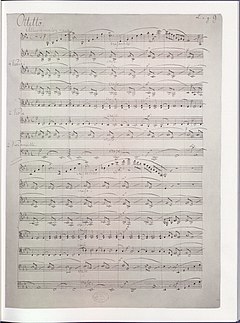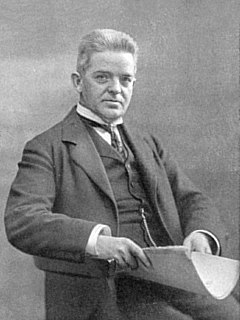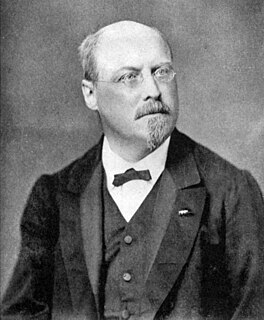Related Research Articles

A septet is a formation containing exactly seven members. It is commonly associated with musical groups but can be applied to any situation where seven similar or related objects are considered a single unit, such as a seven-line stanza of poetry. In jazz, a septet is any group of seven players, usually containing a drum set, string bass or electric bass, and groups of one or two of the following instruments, guitar, piano, trumpet, saxophone, clarinet, or trombone. See, for example, Miles Davis, and Septet by Chick Corea.

Carl Heinrich Carsten Reinecke was a German composer, conductor, and pianist in the Middle Romantic Era.

The Octet in F major, D. 803 was composed by Franz Schubert in March 1824. It was commissioned by the renowned clarinetist Ferdinand Troyer and came from the same period as two of Schubert's other major chamber works, the 'Rosamunde' and 'Death and the Maiden' string quartets.

In music, an octet is a musical ensemble consisting of eight instruments or voices, or a musical composition written for such an ensemble.
In music, a nonet is a composition which requires nine musicians for a performance, or a musical group that consists of nine people. The standard nonet scoring is for wind quintet, violin, viola, cello, and contrabass, though other combinations are also found.
The Septet in E-flat major for clarinet, horn, bassoon, violin, viola, cello, and double bass, Op. 20, by Ludwig van Beethoven, was sketched out in 1799, completed, and first performed in 1800 and published in 1802. The score contains the notation: "Der Kaiserin Maria Theresia gewidmet", or translated, "Dedicated to the Empress Maria Theresa."

The String Octet in E-flat major, Op. 20, was written by Felix Mendelssohn during the fall of 1825 and completed on October 15 at the age of 16. Written for four violins, two violas, and two cellos this work created a new genre in the world of chamber music. Because of this, the octet would be the piece that put Mendelssohn's name with other composers of his time and before him. (Christiansen) Conrad Wilson summarizes much of its reception ever since: "Its youthful verve, brilliance and perfection make it one of the miracles of nineteenth-century music." This was one of the first works of Mendelssohn that was received very well by the world.
The Serenade No. 10 for winds in B-flat major, K. 361/370a, is a serenade by Wolfgang Amadeus Mozart scored for thirteen instruments: twelve winds and string bass. The piece was probably composed in 1781 or 1782 and is often known by the subtitle "Gran Partita", though the title is a misspelling and not in Mozart's hand. It consists of seven movements.
Hyacinthe Jadin was a French composer who came from a musical family. His uncle Georges Jadin was a composer in Versailles and Paris, along with his father Jean Jadin, who had played bassoon for the French Royal Orchestra. He was one of five musical brothers, the best known of whom was Louis-Emmanuel Jadin.
The Octet in E-flat major by Ludwig van Beethoven, Op. 103, is a work for two oboes, two clarinets, two bassoons, and two horns. Beethoven wrote the work in 1792 in Bonn before he established himself in Vienna. He reworked and expanded the Octet in 1795 as his first String Quintet, Op. 4. The Octet was not published until 1834 by Artaria, thus explaining the high opus number despite its date of composition.
Fenwick Smith was an American flutist. He studied under Joseph Mariano at the Eastman School of Music, graduating from there in 1972. Shortly thereafter he became a member of the New England Woodwind Quintet and began a thirteen-year membership with Boston Musica Viva. He became the assistant principal flutist of the Boston Symphony Orchestra in 1978, serving in that position until September 2006. During this time he was also principal flutist of the Boston Pops Orchestra. Smith was also a member of the Boston Chamber Music Society since 1984, and since 1983 gave annual recitals at Jordan Hall.

Carl Nielsen's Wind Quintet, or as indicated by the original score, the Kvintet for Flöte, Obo, Klarinet, Horn og Fagot, Op. 43, was composed early in 1922 in Gothenburg, Sweden, where it was first performed privately at the home of Herman and Lisa Mannheimer on 30 April 1922. The first public performance was on 9 October 1922 in the smaller hall at the Odd Fellows Mansion in Copenhagen. It is considered a staple of the repertoire for wind quintet.
Josef Triebensee (Trübensee) was a Bohemian composer and oboist.

Symphony No. 1 in D major, An das Vaterland, Op. 96, was composed by Joachim Raff between 1859 and 1861.

The Octet for Strings in C major, Op. 7, is an octet composition for string instruments by the Romanian composer George Enescu, completed in 1900. Together with the Octet in F major, Op. 17 (1849) by Niels Gade, it is regarded as amongst the most notable successors to Felix Mendelssohn's celebrated Octet, Op. 20.

Carl Andreas Göpfert was a German virtuoso clarinettist, and composer. Göpfert composed in several genres, including symphonies, concerti, wind ensembles, sonatas, and songs.
Hubert Parry's Nonet in B-flat major for nine wind instruments is a composition for chamber ensemble composed around 1877. Not performed in the composers lifetime, it remained unpublished until 1988 when Edition Compusic published the work under the posthumous opus number 70.
Franz Lachner's Octet in B-flat major, Op. 156 is a composition for eight wind instruments composed around 1850. While scored for a chamber ensemble, the work is considered to be symphonic in scope.
A concert piece is a musical composition, in most cases in one movement, intended for performance in a concert. Usually it is written for one or more virtuoso instrumental soloists and orchestral or piano accompaniment.

The Decet for winds in D major, Op. 14, is a chamber music work by the Romanian composer George Enescu, written in 1906 and first performed in Paris the same year. A performance lasts about 23 minutes.
References
- Notes
- ↑ Winther 2004 , p. 106
- ↑ Hoover 2014
- Sources
- Hoover, Michael (2014-04-02). "Program Notes (4 April 2014)". Chicago Symphonic Winds. Retrieved 2015-10-03.
- Rentería, Lisa M. (2007). The Bassoon's Essential Role in the Evolution of the Wind Octet (PDF) (D. M. A). University of Arizona.
- Smith, Fenwick (2008). Carl Reinecke: Octet/Von der Wiege bis zum Grabe (From the Cradle to the Grave)/Sextet (CD). Naxos Records. 8.570777.
- Winther, Rodney (2004). An Annotated Guide to Wind Chamber Music. Alfred Music. ISBN 9781457449970.